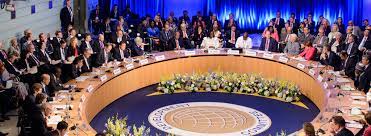The World Bank Group, at the midweek, hinged its strident calls over the years on Nigeria’s Federal Government to rethink its subsidy regime on the need to carefully target such at the poor and vulnerable in the society, besides the unsustainable cost.
Fielding questions at the opening press conference of the Spring Meetings in Washington DC, David Malpass, President of the World Bank Group, against the backdrop of the country’s plan to spend N4tr this year on petrol subsidy arising from the soaring crude oil prices, restated the need for the Federal Government to discontinue its appropriation for subsidy the way it is today, insisting that it is generalized and benefits mostly those in the upper-income class, apart from having “significant negatives.”
Specifically, he said such method of subsidies “are expensive because they go to everyone, and they’re often taken–more used by people with upper incomes than by people with lower incomes; they’re not targeted.”
Rather than being generalized, Malpass said the group encourages, when necessary, carefully and targeted “subsidy for either food or for fuel” that is directed at people “most in need.
He also noted Nigeria’s “multiple exchange rate system, which is complicated and is not as effective as it would be if there were a single exchange rate. The most useful thing for development is to have a single exchange rate that’s market-based, that is stable over long periods of time. That attracts investment and it also means that there is discipline within the country’s fiscal policies. That would help.
“And then, Nigeria also has trade barriers that distort trade flows, and that could be improved substantially in order to help the people in Nigeria move forward.
“I do take note of the complicated situation that they face. There are weapons flowing in through northern Africa that find their way to non-Nigerians that create violence in Nigeria. This is a very challenging situation that the government faces. And I think we, all over the world, people should have an understanding of the fragility that’s facing several parts of the world, but in particular the Sahel and the Sub-Saharan African area where the weapons flow from outside of Africa is putting a grave burden on governments around the continent,” he added.
The World Bank Group President noted despite these drawbacks that the country has a huge opportunity for accelerated growth because of its natural resources and people, with improvements in policy.
Fielding another question, against the background of the ongoing Russia-Ukraine war, he called for policies that are strong enough to attract investment from their citizens and foreigners, especially targeted at growth and revenue mobilisation that should attract private sector investment
“There’s been a tendency to have too much emphasis on government-led investment, which doesn’t end up adding to the competitiveness and the productivity as much as it should, if it were less centralized. I think those steps are important,” Malpass noted, while speaking on whether governments should improve revenue mobilisation, or issue Eurobonds to correct their deficit position.
“As far as euro bonds, the challenge is for governments to use the proceeds very effectively now if they borrow. A giant conflict of interest is that sitting governments are able to borrow, and then future governments and the people of their countries have to pay back the borrowing. Remember, when you borrow principal, you only get to do it once, even if you roll over at zero percent interest rates into the future, which isn’t actually available for developing countries–if you roll over at a low interest rate you still are not able to borrow the principal again. It’s only a one-time supply of money, and that has to be used very effectively.
“And my worry is that hasn’t been the case in certain countries, and they’re left with unsustainable debt. As I mentioned in the opening remarks, it’s important that we have prompt, early resolution processes for unsustainable debt. And we’re working on that with the IMF, collaborating and encouraging the G20 to move quickly in that regard,” he however lamented.








